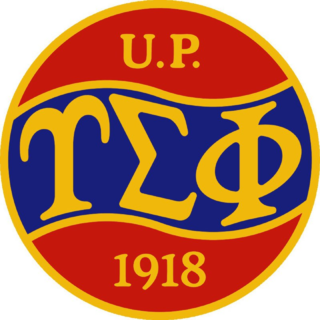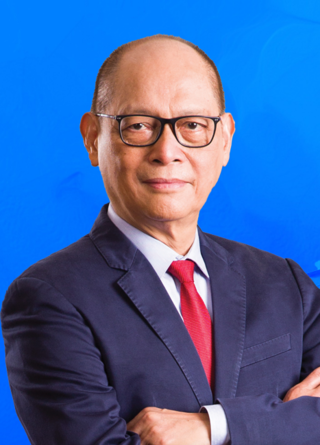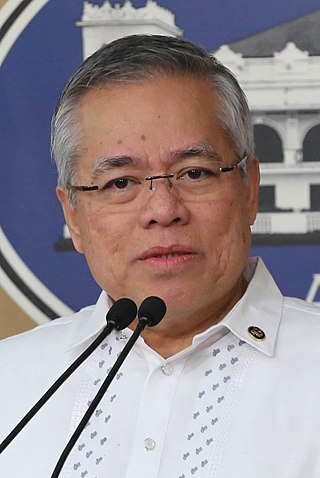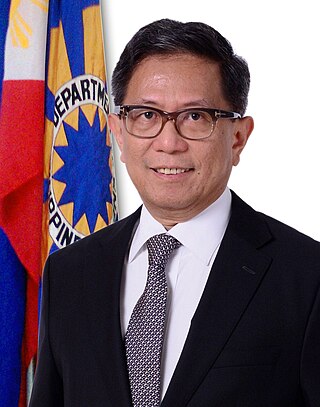
The University of the Philippines is a state university system in the Philippines. It is the country's national university,as mandated by Republic Act No. 9500,giving it institutional autonomy.

The University of the Philippines Diliman,also referred to as UP Diliman or simply University of the Philippines (UP),is a public,coeducational,research university located in Diliman,Quezon City,Philippines. It was established on February 12,1949,as the flagship campus and seat of administration of the University of the Philippines System,the national university of the Philippines.

The University of the Philippines Manila is a public,coeducational,research university located in Ermita,Manila,Philippines. It is known for being the country's center of excellence in the health sciences,including health professional education,training,and research. It is the oldest of eight constituent universities of the University of the Philippines System,and predates the founding of UP by three years. It was originally established on December 1,1905,as the Philippine Medical School and later renamed as the UP College of Medicine and Surgery on June 10,1907. In 1983 it was renamed as University of the Philippines Manila.

Lyceum of the Philippines University,also referred to by its acronym LPU,is a private,non-sectarian,coeducational higher education institution located at Intramuros in the City of Manila,Philippines. It was founded in 1952 by JoséP. Laurel,who was the third president of the Republic of the Philippines.

The Upsilon Sigma Phi (ΥΣΦ) is the oldest Greek-letter organization and fraternity in Asia. Founded in 1918,it is also the oldest student organization in continuous existence in the University of the Philippines. It has two chapters—a single chapter for the UP Diliman and the UP Manila campuses,and another for the UP Los Baños. Membership remains exclusive to UP students,and is by invitation only.

The Department of Trade and Industry is the executive department of the Philippine government responsible for the advancement,promotion,governance,regulation,management and growth of industry and trade.

Science and technology in the Philippines describes scientific and technological progress made by the Philippines and analyses related policy issues. The main agency responsible for managing science and technology (S&T) is the Department of Science and Technology (DOST). There are also sectoral councils for Forestry,Agriculture and Aquaculture,the Metal Industry,Nuclear Research,Food and Nutrition,Health,Meteorology,Volcanology and Seismology.

The University of the Philippines Visayas is a public research university in Iloilo,Philippines. A constituent university of the University of the Philippines system,it teaches management,accountancy,marketing,economics,chemistry,applied mathematics and physics,marine science education and research,fisheries,and aquaculture. It offers regional studies programs on the preservation and enrichment of the Visayan cultural heritage.

The University of the Philippines College of Law is the law school of the University of the Philippines Diliman. Formally established in 1911 in UP Manila,it is the third oldest continually-operating law school in the Philippines. Since 1948,it has been based in UP Diliman in Quezon City,the flagship of the UP System's eight constituent universities. The college also holds extension classes at the Bonifacio Global City campus of UP Diliman in Taguig and the Iloilo City campus of UP Visayas.

Benjamin Estoista Diokno is a Filipino economist who currently serves as one of the six members of the Monetary Board of the Bangko Sentral ng Pilipinas,which conducts the country's monetary policy and supervises its financial system. Diokno previously served as Secretary of Budget and Management under President Joseph Estrada from 1998 to 2001 and under President Rodrigo Duterte from 2016 to 2019. He also served as the Governor of the Bangko Sentral ng Pilipinas and the chairman of its Monetary Board,as well as ex officio chairman of the Anti-Money Laundering Council,from 2019 to 2022 under President Duterte His last Cabinet-level position was being the Secretary of Finance from 2022 to 2024 under President Bongbong Marcos.

The University of the Philippines Diliman School of Economics (UPSE) is a degree-granting unit of the University of the Philippines Diliman specializing in the study of economics. Established in 1965,the School of Economics was chosen as the first and only CHED Center for Excellence in Economics in the Philippines in 1999.

Alfredo Mahar Francisco Amante Lagmay is a Filipino geologist. He is executive director of Project NOAH and a professor at the National Institute of Geological Sciences of the University of the Philippines Diliman.

Fortunato "Boy" Tanseco de la Peña is a Filipino engineer and professor who served as the Secretary of Science and Technology in the Cabinet of President Rodrigo Duterte from 2016 to 2022. Before he assumed leadership of the Department of Science and Technology (DOST),he was the Undersecretary for Scientific and Technological Services from 2001 to 2014. Except for his brief retirement from 2014 to 2016,he has been with the department since 1982.

Carlos "Sonny" García Domínguez III is a distinguished Filipino businessman who was appointed as Philippine Cabinet Secretary thrice:as Minister of Natural Resources (1986-1987),Secretary of Agriculture (1987-1989),and as Secretary of Finance (2016-2022).

Ramon Mangahas Lopez is a Filipino businessman who served as the Secretary of Trade and Industry under the Duterte administration from 2016 to 2022. After his term as Department of Trade and Industry Secretary,he was elected as Independent Director of SM Investments Corporation (SMIC) on August 3,2022.

Danilo Lardizabal Concepcion,often referred to by his nickname DaniCon,is a Filipino lawyer who served as the 21st president of the University of the Philippines. Prior to his appointment as UP president,he was the dean and a professor of law at the UP College of Law and the Executive Director of the UP Bonifacio Global City Campus. He is husband to lawyer Gaby Concepcion.

Claire Dennis Sioson Mapa is a Filipino economist and statistician. He is the National Statistician and Civil Registrar General (NSCRG) of the Philippine Statistics Authority with a rank of Undersecretary as appointed by President Rodrigo Duterte. He succeeds Lisa Grace Bersales whose tenure ended on 22 April 2019.

Raphael Perpetuo "Popo" Mercado Lotilla,is a Filipino lawyer,businessman and government official. He is the Secretary of Energy under the administrations of Presidents Gloria Macapagal Arroyo and Bongbong Marcos,respectively.

The Maharlika Wealth Fund (MWF),also known as the Maharlika Investment Fund (MIF),is a sovereign wealth fund for the Philippines which is managed by the Maharlika Investment Corporation (MIC). The MIF is the Philippines' first sovereign wealth fund. It will be allocated across a variety of assets,including foreign currencies,fixed-income instruments,domestic and foreign corporate bonds,commercial real estate,and infrastructure projects.The MIF is expected to generate returns that support the government's economic goals,as outlined in the Medium-Term Fiscal Framework,the eight-point Socioeconomic Agenda,and the Philippine Development Plan.

Maria Cristina Aldeguer-Roque is a Filipino business executive and government official who is serving as the Philippine Secretary of Trade and Industry since 2024. Prior to her appointment as secretary by President Bongbong Marcos,she served as an undersecretary at the Department of Trade and Industry.





















